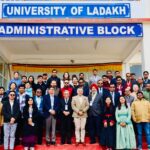PERSPECTIVE
In the ever-evolving landscape of education, teachers have been the cornerstone of knowledge dissemination and academic progression. Their role extends far beyond the confines of the classroom, shaping students’ intellectual curiosity, critical thinking abilities, and lifelong learning habits. But, a crucial aspect, often overlooked, is the impact of teachers’ own reading habits on their students’ educational journey.
Teachers, as the primary facilitators of learning, are expected to be voracious readers themselves. Reading not only broadens their understanding of subjects but also enhances their pedagogical skills, creativity, and ability to adapt to new and trending requirements of the time. The lack of emphasis on teachers’ reading habits poses a significant challenge. When teachers neglect their own reading practices, it reverberates throughout the academic environment, affecting students in multifaceted ways. If the situation is allowed to remain unchanged even now, teachers, themselves, would be rendered irrelevant in the well advanced knowledge boom easily available on internet based applications and websites.
Here are some key consequences of teachers’ insufficient or absence of reading habits:
Shrinking up Knowledge Base
Teachers who do not engage in regular reading may possess a limited understanding of their subject matter, hindering their ability to provide comprehensive instruction. This deficiency can result in students receiving incomplete or outdated information, impeding their academic growth, which is an unpardonable crime, not pondered over by a number of teachers.
Lack of Ignition to Inspire
Reading serves as a source of inspiration, igniting students’ passion for learning and exploration. When teachers fail to model this behavior, students may struggle to find motivation and enthusiasm for academic pursuits, leading to disengagement and apathy in and outside the classroom.
Defective Instructional Strategies
Educators who do not stay abreast of educational research and pedagogical trends may rely on outdated or ineffective teaching methods. This can impede students’ ability to grasp complex concepts, stifle creativity, and inhibit their overall academic development.
Impeding Opportunities for Critical Thinking
Reading fosters critical thinking skills by exposing individuals to diverse perspectives, challenging ideas, and thought-provoking narratives. Teachers who do not prioritize reading miss opportunities to cultivate these essential skills in their students, limiting their capacity for independent thought, analysis and interpretation.
Failure to Align with Educational Policy Documents
Neglecting to read policy documents such as the National Education Policy (NEP-202) or National Curriculum Framework (NCF) can result in teachers being uninformed about the vision, guidelines and objectives set by educational authorities to face the future challenges with wisdom and success. This disconnect may lead to discrepancies between classroom practices and overarching educational goals, causing confusion and inefficiency in the learning process. Educational policies are made to set a road map for a smooth journey leading to holistic academic elevation in accordance with the demands of the time in the present and future without disconnecting from the past.
Addressing these challenges requires a concerted effort to prioritize and promote a culture of reading among educators. School administrators and policymakers play a pivotal role in fostering an environment based on concrete and result oriented mechanism that encourages continuous learning and professional development.
Here are some strategies to promote teachers’ reading habits and enhance student outcomes:
Professional Development Initiatives: Implement professional development programmes that emphasize the importance of reading, which can make teachers officially bound to read at least policy documents so that the policy objectives and targets are realized on the ground. This must be aligned to the teachers’ performance index. The academic monitoring / supporting institutions must identify such documents, books and journals and other resources online /offline for the convenience of teachers.
Collaborative Learning Communities: Foster collaborative learning communities where teachers can share insights, discuss relevant literature, and collaborate on integrating new knowledge and strategies into their teaching practices. Organising such collaborative and sharing initiatives at cluster level is quite easy to create a vibrant academic atmosphere around.
Modelling by School Leaders: School leaders should lead by example, demonstrating a commitment to reading and lifelong learning. This can be achieved through regular communication about their own reading habits, recommendations for relevant literature, and support for teachers’ professional growth. Brief talks of well read school leaders at morning assembly sessions could honestly produce a ripple effect. Because reading habit is a strong force to emit words of wisdom to leave an invaluable impression and inspiration around.
Promotion of Policy Awareness: Ensure that teachers are well-informed about educational policies and frameworks by providing training sessions, workshops, and resources specifically focused on positive policy interpretation and comprehension at all administrative levels.
The impact of teachers’ reading habits on student learning cannot be overstated. By prioritizing continuous learning and professional development, teachers can inspire and empower the next generation of learners to reach their full potential. It is through a collective commitment to reading and intellectual growth that we can cultivate a culture of excellence in education and ensure a brighter future for all students.
(The author is a regular columnist of Rising Kashmir and can be reached at [email protected])








